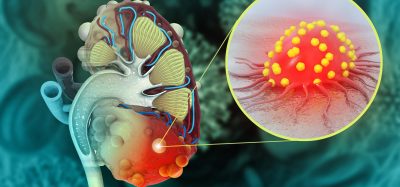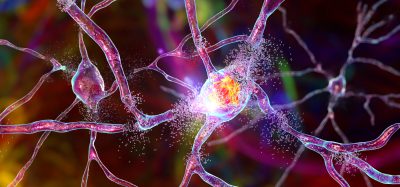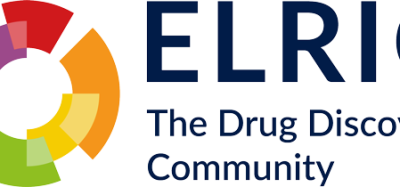Artificial intelligence: a great crash of hype into reality
Posted: 30 January 2023 | Dr Aaron Daugherty | No comments yet
Technology is infamous for falling into a hype cycle, with its peaks and valleys of exaggerated expectations and disillusionment — AI-driven drug discovery is no exception. In this article, Aaron Daugherty, Vice President Discovery at Aria Pharmaceuticals, highlights how the industry can use AI to transform research.


For well over a decade, the promise of artificial intelligence (AI) has been overinflated with notions that it will revolutionise pharmaceutical research in ways never thought possible. This hype, as seen in news headlines and at conferences around the globe, has set unrealistic expectations for AI as being able to single-handedly solve complex biology problems and deliver breakthrough treatments at unthinkable speed. Clearly, that has not been the case to date.
McKinsey & Company has identified nearly 300 companies operating in the AI-driven drug discovery space, but dually notes that only a small percentage have built a pipeline of assets moving into pre-clinical research. Further, most of the even smaller fraction of companies with candidates in clinical research have in-licensed those assets or have developed them using traditional discovery approaches. This data tells us that results delivered by many AI-powered drug discovery companies to date have fallen short of initial expectations.
Recently, however, the conversation about the role of AI in drug discovery has begun to shift to a more productive and practical examination of its true potential as a tool to support scientists throughout the drug discovery process. My hope is that this crash of hype into a new realistic reality does not dampen further investment or interest, because there is still significant progress being made – just not at the level hyped over the last decade. In fact, we are entering an exciting and promising new phase of AI in drug discovery; one underscored by a clearer understanding of the true value of AI in this data-heavy industry: for problem solving.
AI as a complement, not substitute
The first step is to not let a perceived lack of progress dictate the future application of AI in drug discovery. There will be a continuing focus on utilising AI to help assuage many of the complexities in drug discovery. We must acknowledge, however, that AI has limitations and must therefore be integrated carefully. I would argue that proper integration uses AI as a toolset that supports and accelerates the work of scientific discovery rather than replaces it. Essentially, AI can improve drug discovery, but only with appropriate application.
Trends in 2023
One trend I have noted, and already alluded to, is a move towards integration within the functions of existing drug discovery teams. More biopharmaceutical companies are understanding the value of AI, and as such, there is greater integration among biomedical scientists and data scientists. Much of the early hype was due to too many companies saying they can use AI to find drugs faster and better, but without acknowledging that high quality lab and clinical science is a prerequisite for ultimate success.
Proprietary data, software and technology are all wonderful talking points, but they are useless if they are not informed by and guided by the expertise of pharmaceutical scientists. Technology and AI should never aim to replace researchers. It should aim to make them superpowered. At the same time, experts in technology and data need an equal seat at the table alongside biologists, chemists, clinicians and others to make an impact. The future is one of integration between all the disciplines necessary to make an effective medicine.
The second trend is a growing understanding of the extreme complexity of some chronic diseases, and a recognition that AI will be necessary to untangle these biological complexities. As we gather increasing amounts of knowledge about disease, making sense of the data is becoming exponentially harder.
I would argue that proper integration uses AI as a toolset that supports and accelerates the work of scientific discovery rather than replaces it”
A fundamental issue with traditional drug discovery is that it necessarily uses a reductionist approach – looking for potential treatments with only a limited view of the disease pathology. Scientists will screen compounds against one or two aspects of a complex disease, whether that is the activity of a single protein target or the modification of a single phenotype. However, as our understanding of disease becomes more complex and interconnected, this traditional approach to finding treatments quickly becomes limited.
This is where AI has value in breaking through. AI allows us to interrogate potential treatments against completely unconnected multimodal data at the same time, giving us a more complete picture of the disease biology and consequently a better understanding of how any given treatment will affect the disease. Rather than face a decline in pharmaceutical breakthroughs in tandem with a growing complexity of disease, these new tools can help us continue to innovate and find new treatments. Further, as more data becomes available, disease complexity, when coupled with the capabilities of AI, becomes an asset towards finding better, safer and more effective medicines.
Finally, not so much a trend as an inevitable next step, is that drugs discovered by integrated medical and data science teams will begin making their way into clinical research in critical mass. A few things interest me as this happens: first is whether these candidates will see a higher success rate than those discovered by traditional methods. Second is whether a given candidate produces a breakthrough in how we treat the disease, which would be a never-before-considered mechanism of action (MOA) or a new approach altogether. The value of AI has been positioned against speed, efficiency, and the ability of machines to identify signals that would otherwise be overlooked by traditional screening methods. In other words, if AI discovers a “me too” candidate that ultimately succeeds, what value beyond the obvious have we achieved?
Artificial intelligence-aided screening could boost speed of new drug discovery
Deploying technology to make the traditional drug discovery approach more efficient and faster is not inherently wrong, but it does not aim to solve the real problem, which is the complexity of human disease. AI, at its best, processes data with unthinkable accuracy and speed at a massive scale. The growing body of data we have against thousands of diseases is unsurmountable with current approaches, yet it is key to finding breakthroughs.
Nobody can predict the future of the clinical work that lies ahead, but I firmly believe there will be a line drawn in the sand. Companies that are focused exclusively on building AI software and utilising proprietary datasets will see some success, but not at the bar set in the early whirlwind of hype. Companies that look to integrate AI into the pharmaceutical research process targeted at this looming problem of growing disease complexity and masses of data will innovate stronger and help to drive an entire rethink and redesign of pharmaceutical R&D.
Technology and AI should never aim to replace researchers. It should aim to make them superpowered”
It is worth noting that pharmaceutical R&D is risky. However, AI offers significant potential to increase our success rates by focusing on novel candidates that have the best chance for safety and efficacy in humans.
All measures point to 2023 being the year where we move from hype and unrealistic expectations into the integration of AI in pharmaceutical discovery that is focused on the problems we are trying to solve with realistic expectations. We are headed into a future where the true value of AI will impact productivity in the realm of hard-to-treat and complex diseases. Some businesses may suffer from not delivering on overpromised hype, but the strongest players will help to drive new innovations and important new discoveries that benefit patients.


Related topics
Artificial Intelligence, Big Data, Bioinformatics, Drug Discovery, Lab Automation, Screening








